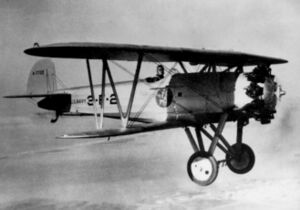Engineering:Boeing F3B
| F3B | |
|---|---|

| |
| Boeing F3B-1, U.S. Navy Photo | |
| Role | Carrier-based Fighter-Bomber |
| Manufacturer | Boeing |
| First flight | 3 February 1928 |
| Introduction | August 1928[1] |
| Primary user | United States Navy |
| Number built | 74 including the prototype[1] |
| Developed from | Boeing F2B, FB-5 |
The Boeing F3B was a biplane fighter and fighter bomber that served with the United States Navy from 1928 into the early 1930s.
Design and development
Designed by the company as its Model 74, the plane was an incremental improvement over the F2B. The Navy-designated prototype XF3B-1 still had the tapered wings of the F2B for instance, but was built as a single-float seaplane using the FB-5 undercarriage. However, the growing use of aircraft carriers took away most of the need for floating fighters, and by the time other test results had been taken into account, the production F3B-1 (Model 77) had a larger upper wing that was slightly swept back and a redesigned tail with surfaces made from corrugated aluminum.[2] It also eliminated the spreader bar arrangement of the undercarriage and revised the vertical tail shape.[3]
Operational history
It first flew on 3 February 1928, turning in a respectable performance and garnering Boeing a contract for 73 more. F3Bs served as fighter-bombers for some four years with the squadrons VF-2B aboard missing name, VB-2B aboard missing name (later VF-6B), and VB-1B on missing name,[1][3] during which period some were fitted with Townend rings and others with streamlined wheel fairings.[2] The aircraft remained in first-line service to 1932 and were then retained as "hacks" (command and staff transports) for several more years.[3]
Variants
- XF3B-1
- (Model 74) One prototype serial number A7674[1]
- F3B-1
- (Model 77) Single-seat fighter biplane for the US Navy, 73 aircraft serial numbers A7675-A7691; A7708-A7763[1]
Operators
 United States
United States
- United States Navy
Specifications (F3B-1)
Data from The Complete Encyclopedia of World Aircraft [3]
General characteristics
- Crew: 1
- Length: 24 ft 10 in (7.57 m)
- Wingspan: 33 ft 0 in (10.06 m)
- Height: 9 ft 2 in (2.79 m)
- Wing area: 275 sq ft (25.55 m2)
- Empty weight: 2,179 lb (988 kg)
- Max takeoff weight: 2,945 lb (1,336 kg)
- Powerplant: 1 × Pratt & Whitney R-1340-80 Wasp radial engine, 425 hp (317 kW)
Performance
- Maximum speed: 157 mph (253 km/h, 137 kn)
- Cruise speed: 131 mph (211 km/h, 114 kn)
- Range: 340 mi (547 km, 296 nmi)
- Service ceiling: 21,500 ft (6,555 m)
- Rate of climb: 2,020 ft/min (10.26 m/s)
Armament
- Guns: Two 0.3 in (7.62mm) forward firing Browning machine guns in the forward fuselage
- Bombs: Five 25 lb (11.3 kg) bombs carried under the fuselage and lower wing
See also
Related development
Related lists
- List of military aircraft of the United States
- List of fighter aircraft
References
Notes
Bibliography
- Eden, Paul and Soph Moeng, eds. The Complete Encyclopedia of World Aircraft. London: Amber Books, 2002. ISBN 0-7607-3432-1.
- Jones, Lloyd S. U.S. Naval Fighters. Fallbrook, California: Aero Publishers, 1977. ISBN 0-8168-9254-7.
- Swanborough, Gordon and Peter M. Bowers. United States Navy Aircraft Since 1911. Annapolis, Maryland: Naval Institute Press, 1976. ISBN 0-87021-968-5.
External links
 |
